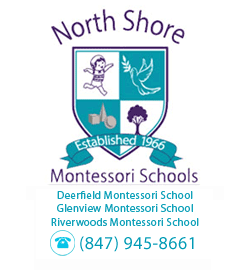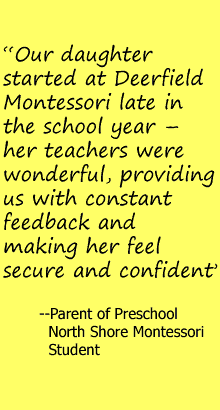Montessori Education - "An Assist to Life"
-
•Absorbent Mind
A Montessori education is based on scientific observations made by Dr. Montessori of the young child. Dr. Montessori said, "It is simply an assist to life." She noted that young children learn with great ease by simply "absorbing" like a sponge everything to which they are exposed, rather than learning through logical analysis. This is called the "absorbent mind".
•Sensitive Periods
Dr. Montessori found that there are periods during which the energy of the child's total being seems to be focused upon a particular stage of development such as walking, talking, writing, and reading. These are called "sensitive periods" (now called developmental stages).
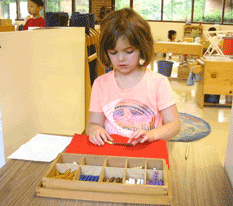
•Prepared Environment
In a Montessori classroom, the prepared learning environment is designed to support these sensitive periods of the children and allow them to easily learn at their own individual rhythm.
•Curriculum
Areas of a prepared environment include practical life, sensorial, math, language, science, geography, art, music, and movement.
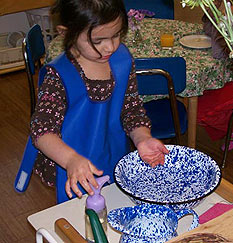 Montessori Offers A Unique Approach to Education
Montessori Offers A Unique Approach to Education
When you enter our Montessori classrooms, you will notice a number of activities, or "work", unique to Montessori education. These self-correcting, manipulative materials are specially designed and developed for the Montessori classroom. We've placed them low on small shelves which are easily accessible to every child. This gives the children freedom, within the limits of safety and respect, to choose activities for themselves that they will succeed in doing. Many little successes build self-confidence and develop knowledge. Additionally, multi-age classes follow three year cycles and the natural development of the child.
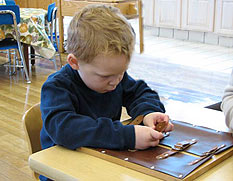 Montessori Integrates Individual Choice and Group Activities
Montessori Integrates Individual Choice and Group Activities
Our classroom time is loosely structured by a routine each day, including line time (group music and movement), free work time, outdoor recreation, and snack time. However, during free work times the children can choose which materials they work on a given day. For example, one child may like to work with math materials while another may want to do an art project or geography puzzle. The prepared materials are self-correcting, which means they encourage learning and confidence by allowing children to find the correct answer on their own. Children learn independence and the ability to think and do for themselves. Additionally, the teacher gives individual and group lessons to the children when they need a "key concept" to further their discoveries.
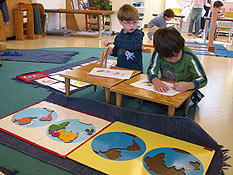 Montessori Promotes Natural Social Development with Multi-Age Grouping
Montessori Promotes Natural Social Development with Multi-Age Grouping
Our classrooms are designed to encourage socialization through time for spontaneous interactions (such as: chatting with a friend over a snack, choosing a friend to work with on an activity, or simply playing together in different groups of friends). The multi-age, "family grouping", of 3, 4 and 5 year olds in a Montessori classroom supports the natural social development of young children. They collaborate and help each other.
At three years of age, children still enjoy individual activity, next to another (parallel play). They are aware of others and are observing older children as well as exploring ways to interact with them. Lessons of "grace and courtesy" reinforce the key concept of respect for oneself, others and the environment.
At four years of age, the children begin to refine ways to positively interact with others and develop friendships.
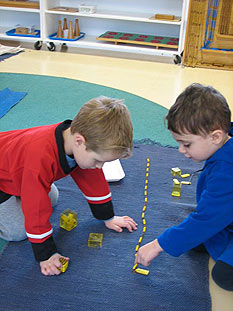
At five years of age, the children are strengthening friendships and helping younger children with learning and with the social graces.
In order for children to develop strong social skills, they need to live and learn through all of these stages in the multi-age society.
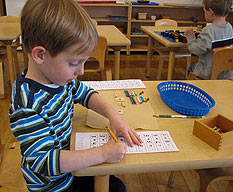 Montessori "Follows the Child"
Montessori "Follows the Child"
Our highly qualified Montessori instructors observe children as individuals. We gather information about each child to determine how best to encourage his or her development. Daily records are kept about your child's choices, progress and new lessons. The teacher then creates the environment from which the child learns. She is the observer and supporter of the child's spontaneous activity. Children can then follow their own inner direction to develop their own unique personality and talents. Dr. Montessori said, "Any unnecessary help is a hindrance."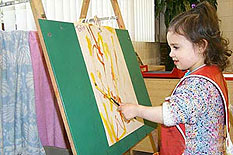
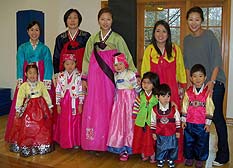
Our schools benefit from a diversity of culture among the student body and teachers. Children from all over the world attend classes here and offer each other a real awareness of the many cultures of the world. Our children practice daily living in peace.
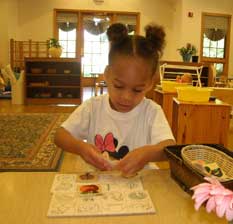 Fully Accredited
Fully Accredited 